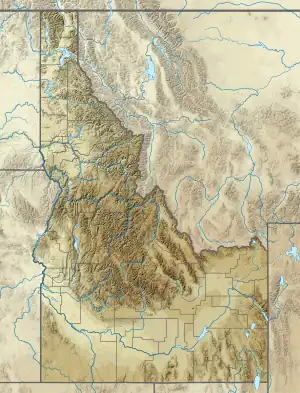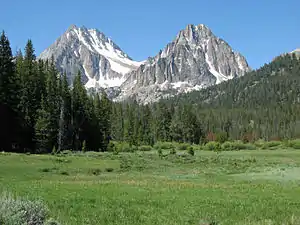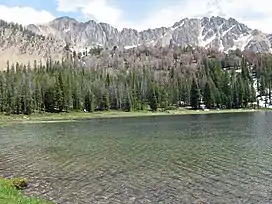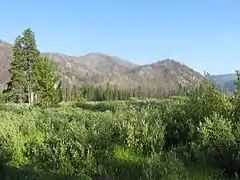| White Cloud Mountains | |
|---|---|
 White Cloud Mountains | |
| Highest point | |
| Peak | Castle Peak |
| Elevation | 11,815 ft (3,601 m) |
| Coordinates | 44°02′22″N 114°35′07″W / 44.039558°N 114.585266°W |
| Dimensions | |
| Length | 25 mi (40 km) N/S |
| Width | 32 mi (51 km) E/W |
| Area | 461 sq mi (1,190 km2) |
| Geography | |
 White Cloud Mountains | |
| Country | United States |
| State | Idaho |
| Parent range | Rocky Mountains |
| Borders on | Sawtooth Mountains and Boulder Mountains |
The White Cloud Mountains are part of the Rocky Mountains of the western United States, located in central Idaho, southeast of Stanley in Custer County. The range is located within the Sawtooth National Recreation Area (SNRA) and partially within the Cecil D. Andrus–White Clouds Wilderness.[1]
The White Cloud Mountains are located on National Forest land, with numerous trails in the area. Camping is permitted anywhere on the national forest land and there are no fees to access the area.[2] Primary access to the area is via State Highway 75, the Salmon River Scenic Byway, which accompanies the main Salmon River as it descends along the range's western and northern perimeter.
The highest peak in the White Cloud Mountains, and the SNRA, is Castle Peak at 11,815 ft (3,601 m).[3] The Sawtooth Mountains are about twenty miles (32 km) west of the White Clouds, on the west side of the river and highway, and the Boulder Mountains are directly south of the White Clouds.
Peaks

Lakes
Mine proposal
In 1970, it was proposed that the White Cloud Mountains be the site of an open-pit mine. The proposal became a major issue in Idaho's 1970 gubernatorial election. Incumbent Republican governor Don Samuelson favored the mine, as it would generate an estimated $4 million in revenue to the state. However, his Democratic opponent, Cecil Andrus, opposed the mine on conservation grounds. His stance was backed by many of the state's urban residents, who enjoyed vacationing at the mountains.[6] Andrus won the election by more than four points, and it has been suggested that Andrus's stance on the mine was a contributing factor to his victory, and in particular to his victories in the normally Republican-leaning urban parts of the state.[6][7]
Photos
 White Cloud Mountains viewed from Sawtooth Mountains
White Cloud Mountains viewed from Sawtooth Mountains Washington Lake in the White Cloud Mountains
Washington Lake in the White Cloud Mountains Castle Peak to left of center
Castle Peak to left of center Fourth of July Lake in the White Cloud Mountains
Fourth of July Lake in the White Cloud Mountains Castle Peak
Castle Peak White Cloud Mountains
White Cloud Mountains Warm Spring Creek in White Cloud Mountains
Warm Spring Creek in White Cloud Mountains Warm Springs Meadow in White Cloud Mountains
Warm Springs Meadow in White Cloud Mountains White Cloud Mountains
White Cloud Mountains White Cloud Mountains across Sawtooth Valley
White Cloud Mountains across Sawtooth Valley Hikers leaving Quiet Lake, which sits at the base of Castle Peak and Merriam Peak.
Hikers leaving Quiet Lake, which sits at the base of Castle Peak and Merriam Peak. Hikers eating lunch at Shallow Lake with the Devil's Staircase on the horizon.
Hikers eating lunch at Shallow Lake with the Devil's Staircase on the horizon.
See also
References
- ↑ "White Clouds". Summitpost.org. Retrieved 2012-05-03.
- ↑ "Sawtooth National Forest". U.S. Forest Service. Retrieved 2012-05-03.
- ↑ "White Cloud Mountains". Peakbagger.com. Retrieved 2012-05-03.
- ↑ Sawtooth National Forest. "Sawtooth National Forest" [map].1:126,720, 1"=2 miles. Twin Falls, Idaho: Sawtooth National Forest, United States Forest Service, 1998.
- ↑ "White Cloud Peak List". Summitpost.org. Retrieved 2012-05-04.
- 1 2 Dumcombe, Herbert; Martin, Boyd (June 1971). "The 1970 Election in Idaho". The Western Political Quarterly. 24 (2): 292–300. doi:10.2307/446873. JSTOR 446873. Retrieved February 8, 2019.
- ↑ Barker, Rocky. "Andrus spent his life protecting this iconic Idaho wilderness; now it will carry his name". Idaho Statesman. The McClatchy Company. Retrieved February 19, 2019.
External links
- Peak Bagger.com - White Cloud Mountains
- Visit Idaho.org - official state tourism site
- Idaho Summits.com - Castle Peak - 11,815 ft.